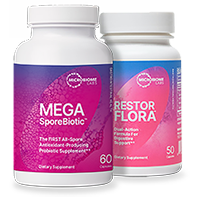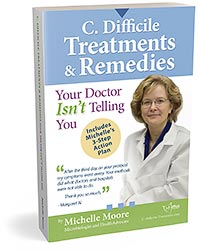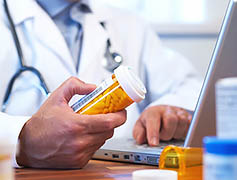 We hear from people all the time who are told by their doctor that they don’t need probiotics for C. difficile. The doctor usually says that there’s no scientific evidence for using probiotics, or that probiotics are a waste of money.
We hear from people all the time who are told by their doctor that they don’t need probiotics for C. difficile. The doctor usually says that there’s no scientific evidence for using probiotics, or that probiotics are a waste of money.
If you’re like most people, you trust your doctor to give you sound medical advice. But the truth is, probiotics are backed by science and have been helping people with C. diff. and other health problems for decades.
Huge Gaps in Doctor’s Training
Most mainstream medical doctors have no training and no experience with any alternative treatments such as probiotics. Therefore, alternative options, no matter how effective, are totally unknown to most doctors.
There are also very powerful forces in the drug industry, insurance industry, the AMA and the FDA that disfavor alternatives and make them next to impossible to be widely used or even known to doctors.
On the care and support side, most doctors are forced by the healthcare system, insurance system and legal system into treating their patients in an assembly line fashion, favoring one-size-fits-all “standard protocol” or “standard of care” treatments.
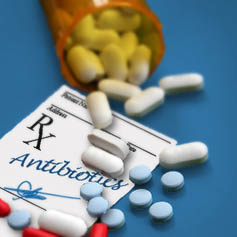
So, the only treatment options you’ll ever get from your doctor are antibiotic drugs and/or a fecal transplant, and you’re unlikely to get support if you choose to use safe and effective alternative remedies such as probiotics. This is true, despite the fact that there’s a large body of scientific evidence backing the benefits of probiotics, as you’ll see below.
What Should You Do?
It’s important to understand that however well intentioned, not every doctor is knowledgeable or has practical experience with C. difficile. And honestly, some doctors are just not as good as others. And even if you see an gastroenterologist, infectious disease doctor or some other specialist, chances are that “standard of care” treatments (antibiotics and fecal transplant) are the only treatment options they will have for you.
While Michelle never tells people to ignore their doctor’s advice, it’s always a good idea to ask how much knowledge, training and experience your doctor has regarding any remedy they either recommend or discourage. It’s a good idea to consider getting a second opinion or finding a new doctor if your current doctor is not giving you the support or providing you the results you need.
It’s also a good idea to consider seeing a holistic or natural doctor, or a medical doctor certified in Functional Medicine. Such doctors usually have more training and experience using probiotics and alternative remedies.
Studies Supporting Probiotics
Below is a list of studies on Bacillus spore probiotics, which are in the probiotics that Michelle recommends. Bacillus spores have been used safely for decades in probiotic products around the world and they are not new. Also note that while scientific studies are important, it’s equally important that a food, supplement or ingredient have a long history of safe and effective use in day to day clinical settings between real doctors and their patients.
Fortunately, there has been much research on Bacillus spores and probiotics containing them. But just as important and valuable are the real-world effects that this and other products are having in people.
 Michelle Moore’s methods outlined in her book and her recommended products are based heavily on real-world experience by consulting with medical professionals about what works with their patients, which is the approach of holistic or natural medicine in general. This approach is very different from mainstream medicine, which relies heavily on “proof” of safety and efficacy through the rigid paradigm of FDA drug approval, the universal use of “standard protocol” treatments and the dismissal and even attack on alternatives.
Michelle Moore’s methods outlined in her book and her recommended products are based heavily on real-world experience by consulting with medical professionals about what works with their patients, which is the approach of holistic or natural medicine in general. This approach is very different from mainstream medicine, which relies heavily on “proof” of safety and efficacy through the rigid paradigm of FDA drug approval, the universal use of “standard protocol” treatments and the dismissal and even attack on alternatives.
Both mainstream and holistic medicine have overlap and usefulness, but they are also very different and usually provide very different results. This important topic is detailed in chapter 4 of Michelle’s book C. difficile Treatment & Remedies.
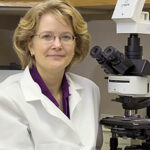
About the Author – Michelle Moore, BSc
Michelle Moore is a microbiologist, holistic health educator, and author of C. difficile Treatments & Remedies. With over 10 years of experience in pharmaceutical research and over 20 years in natural medicine, she helps people overcome C. difficile and other chronic infections naturally.
References:
1. A framework for human microbiome research, The Human Microbiome
Project Consortium, Nature 486, 215–221 (14 June 2012).
2. Host-Pathogen Interactions: the seduction of molecular cross talk, J. Gut
2002;50:32.
3. Recommendations for probiotic use – Floch et al, J Clin Gastroenterol. 2008 Jul.
4. Probiotics for the prevention of Clostridium difficile-associated diarrhea in adults and children, Joshue Z Goldenberg et al, 31 MAY 2013 The Cochrane Library.
5. Timely Use of Probiotics in Hospitalized Adults Prevents Clostridium difficile Infection: A Systematic Review With Meta-Regression Analysis. Shen NT et al. Gastroenterology. 2017 Jun;152(8):1889-190.
6. Validating bifidobacterial species and subspecies identity in commercial probiotic products, Lewis ZT, Pediatr Res. 2016 Mar;79(3):445-52.
7. Pathogen elimination by probiotic Bacillus via signaling interference. Pipat P., Yue Z., Thuan N., Seth D. et el. Nature, 2018.
8. Oral spore-based probiotic supplementation was associated with reduced incidence of post-prandial dietary endotoxin, triglycerides, and disease risk biomarkers. Brian K McFarlin. World J Gastrointest Pathophysiol 2017 August 15; 8(3): 117-126.
9. Bacillus Coagulans GBI-30 (BC30) improves indices of Clostridium difficile-Induced colitis in mice. Fitzpatrick L, Small J, Greene W, Karpa K,Keller D. Gut Pathog. 2011; 3: 16.
10. Bacillus coagulans GBI-30, 6086 limits the recurrence of Clostridium difficile-Induced colitis following vancomycin withdrawal in mice. Fitzpatrick L, Small J, Greene W, Karpa K, Farmer S, Keller D. Gut Pathog. 2012; 4: 13.
11. Probiotics for Prevention of Clostridium difficile Infection. Mills J, Rao K, Young V. Curr Opin Gastroenterol. 2018 Jan; 34(1): 3–10.
12. Secreted Compounds of the Probiotic Bacillus clausii Strain O/C Inhibit the Cytotoxic Effects Induced by Clostridium difficile and Bacillus cereus Toxins. Ripert G. et al. Antimicrob Agents Chemother. 2016 Jun; 60(6):3445–3454.
13. Probiotic strain Bacillus subtilis CU1 stimulates immune system of elderly during common infectious disease period: a randomized, double-blind placebo-controlled study. Lefevre M, Racedo SM, Ripert G, et al. Immun Aging. 2015;12:24.
14. A randomized placebo-controlled trial of Saccharomyces boulardii in combination with standard antibiotics for Clostridium difficile disease. McFarland LV, Surawicz CM, Greenberg RN, Fekety R, Elmer GW. JAMA. 1994 Jun 22-29;271(24):1913-8.
15. A randomized placebo-controlled trial of Saccharomyces boulardii in combination with standard antibiotics for Clostridium difficile disease, McFarland LV, JAMA 1994 Jun 22-29; 271(24):1913-8.
16. Saccharomyces boulardii inhibits Clostridium difficile toxin A binding and enterotoxicity in rat ileum. Pothoulakis et al, Gastroenterology. 1993 Apr;104(4):1108-15.
17. Probiotics in the prevention of antibiotic-associated diarrhoea and Clostridium difficile infection. Hickson M. Therap Adv Gastroenterol. 2011 May; 4(3): 185–197.
18. Saccharomyces boulardii Stimulates Intestinal Immunoglobulin A Immune Response to Clostridium difficile Toxin A in Mice. Qamar et al, Infect Immun. 2001 Apr; 69(4): 2762–2765.
19. Saccharomyces boulardii protease inhibits Clostridium difficile toxin A effects in the rat ileum. Castagliuolo et al. Infect Immun. 1996 Dec;64(12):5225-32.
20. Review article: Anti-inflammatory mechanisms of action of Saccharomyces boulardii. Pothoulakis, C. Aliment Pharmacol Ther. 2009 Oct 15; 30(8): 826–833.
21. Effect of biotherapeutics on cyclosporin-induced Clostridium difficile infection in mice. Kaur et al. J Gastroenterol Hepatol. 2010 Apr;25(4):832-8.
22. Lactobacillus acidophilus CL1285, Lactobacillus casei LBC80R, and Lactobacillus rhamnosus CLR2 (Bio-K+): Characterization, Manufacture, Mechanisms of Action, and Quality Control of a Specific Probiotic Combination for Primary Prevention of Clostridium difficile Infection. Auclair et al. Clinical Infectious Diseases, Volume 60, Issue suppl_2, 15 May 2015,Pages S135–S143.
Specific Studies on Bacillus Species:
1. The use of bacterial spore formers as probiotics, FEMS Microbiology Reviews 29 (2005) 813–835
2. The safety of Bacillus subtilis and Bacillus indicus as food probiotics, Journal of Applied Microbiology ISSN 1364-5072
3. The Intestinal Life Cycle of Bacillus subtilis and Close Relatives, JOURNAL OF BACTERIOLOGY, Apr. 2006, p. 2692–2700
4. Bacillus probiotics, Food Microbiology 28 (2011) 214e220
5. Characterization of Bacillus Species Used for Oral Bacteriotherapy and Bacterioprophylaxis of Gastrointestinal Disorders, APPLIED AND ENVIRONMENTAL MICROBIOLOGY, 0099-2240/00/$04.0010, Dec. 2000, p. 5241–5247
6. Bacillus Probiotics: Spore Germination in the Gastrointestinal Tract, APPLIED AND ENVIRONMENTAL MICROBIOLOGY, May 2002, p. 2344–2352
7. Pathogen elimination by probiotic Bacillus via signaling interference, https://doi.org/10.1038/s41586-018-0616-y
8. Bacillus subtilis antibiotics: structures, syntheses and specific functions, Molecular Microbiology (2005) 56(4), 845–857
9. Immunostimulatory activity of Bacillus spores, FEMS Immunol Med Microbiol 53 (2008) 195–203
10. Efficacy of Bacillus clausii spores in the prevention of recurrent respiratory infections in children: a pilot study, Therapeutics and Clinical Risk Management 2007:3(1) 13–17
11. Effect of Bacillus subtilis spore administration on activation of macrophages and natural killer cells in mice, Veterinary Microbiology 60 1998 215–225
12. The effect of Probiotic Bacillus subtilis HU58 on Immune function in Healthy Human, The Indian Practitioner q Vol.70 No.9. September 2017

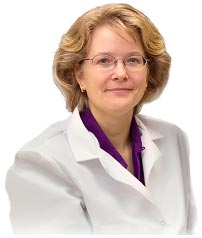
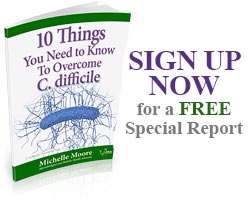 Fill in the form below to get our C. diff. tips newsletter and your free report “10 Things You Need to Know to Overcome C. difficile”.
We value your Privacy. Your email will be kept strictly confidential & secured. See our
Fill in the form below to get our C. diff. tips newsletter and your free report “10 Things You Need to Know to Overcome C. difficile”.
We value your Privacy. Your email will be kept strictly confidential & secured. See our 